Arbitration: Consent, Process, and Comparison with Litigation
VerifiedAdded on 2022/08/18
|11
|2705
|16
Report
AI Summary
This report provides a comprehensive analysis of arbitration as an alternative dispute resolution (ADR) method. It begins by defining arbitration and highlighting its advantages, such as cost-efficiency and speed, compared to traditional litigation. The report delves into the importance of consent in the arbitration process, discussing scenarios where consent is absent and the implications thereof. It examines the advantages and disadvantages of arbitration, particularly when consent is not present, and its impact on legal proceedings. The report also differentiates between family arbitration and corporate arbitration, highlighting the similarities and differences in their processes, including the role of arbitrators and the types of disputes addressed. Furthermore, the report explores the legal frameworks governing domestic and international arbitration, including relevant acts and conventions. The analysis underscores arbitration's role in dispute resolution, emphasizing its global application and the need for cautious use despite its widespread appeal. Finally, the report includes a bibliography of primary and secondary sources.

Arbitration
University
Contact details of the Student
3 / 1 1 / 2 0 2 0
Student Credentials
What is Arbitration and what are its advantages and
disadvantages? Also the issues that arise while pursuing
the process of Arbitration and other such aspects have
also been analysed in the below assignment.
University
Contact details of the Student
3 / 1 1 / 2 0 2 0
Student Credentials
What is Arbitration and what are its advantages and
disadvantages? Also the issues that arise while pursuing
the process of Arbitration and other such aspects have
also been analysed in the below assignment.
Paraphrase This Document
Need a fresh take? Get an instant paraphrase of this document with our AI Paraphraser
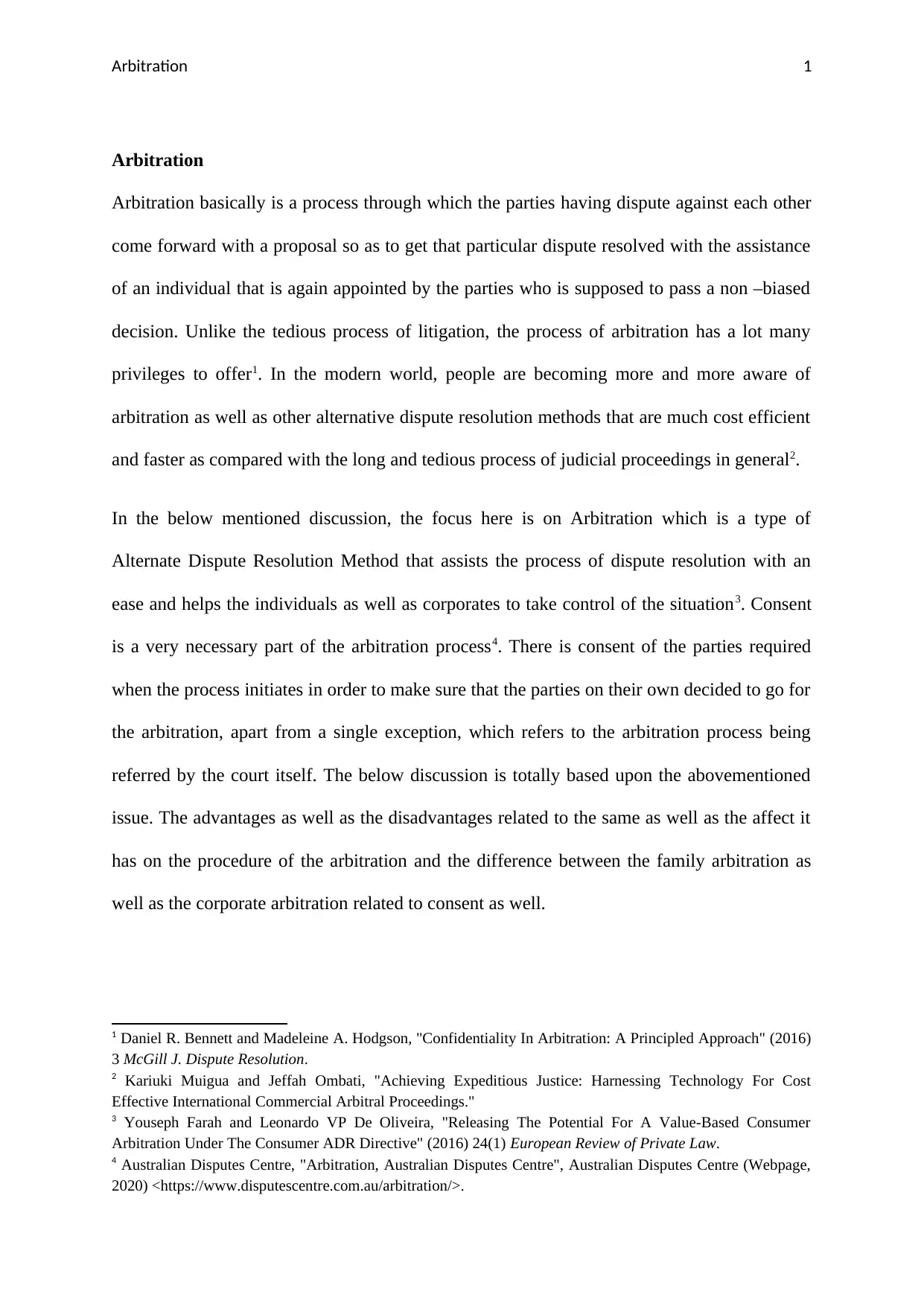
Arbitration 1
Arbitration
Arbitration basically is a process through which the parties having dispute against each other
come forward with a proposal so as to get that particular dispute resolved with the assistance
of an individual that is again appointed by the parties who is supposed to pass a non –biased
decision. Unlike the tedious process of litigation, the process of arbitration has a lot many
privileges to offer1. In the modern world, people are becoming more and more aware of
arbitration as well as other alternative dispute resolution methods that are much cost efficient
and faster as compared with the long and tedious process of judicial proceedings in general2.
In the below mentioned discussion, the focus here is on Arbitration which is a type of
Alternate Dispute Resolution Method that assists the process of dispute resolution with an
ease and helps the individuals as well as corporates to take control of the situation3. Consent
is a very necessary part of the arbitration process4. There is consent of the parties required
when the process initiates in order to make sure that the parties on their own decided to go for
the arbitration, apart from a single exception, which refers to the arbitration process being
referred by the court itself. The below discussion is totally based upon the abovementioned
issue. The advantages as well as the disadvantages related to the same as well as the affect it
has on the procedure of the arbitration and the difference between the family arbitration as
well as the corporate arbitration related to consent as well.
1 Daniel R. Bennett and Madeleine A. Hodgson, "Confidentiality In Arbitration: A Principled Approach" (2016)
3 McGill J. Dispute Resolution.
2 Kariuki Muigua and Jeffah Ombati, "Achieving Expeditious Justice: Harnessing Technology For Cost
Effective International Commercial Arbitral Proceedings."
3 Youseph Farah and Leonardo VP De Oliveira, "Releasing The Potential For A Value-Based Consumer
Arbitration Under The Consumer ADR Directive" (2016) 24(1) European Review of Private Law.
4 Australian Disputes Centre, "Arbitration, Australian Disputes Centre", Australian Disputes Centre (Webpage,
2020) <https://www.disputescentre.com.au/arbitration/>.
Arbitration
Arbitration basically is a process through which the parties having dispute against each other
come forward with a proposal so as to get that particular dispute resolved with the assistance
of an individual that is again appointed by the parties who is supposed to pass a non –biased
decision. Unlike the tedious process of litigation, the process of arbitration has a lot many
privileges to offer1. In the modern world, people are becoming more and more aware of
arbitration as well as other alternative dispute resolution methods that are much cost efficient
and faster as compared with the long and tedious process of judicial proceedings in general2.
In the below mentioned discussion, the focus here is on Arbitration which is a type of
Alternate Dispute Resolution Method that assists the process of dispute resolution with an
ease and helps the individuals as well as corporates to take control of the situation3. Consent
is a very necessary part of the arbitration process4. There is consent of the parties required
when the process initiates in order to make sure that the parties on their own decided to go for
the arbitration, apart from a single exception, which refers to the arbitration process being
referred by the court itself. The below discussion is totally based upon the abovementioned
issue. The advantages as well as the disadvantages related to the same as well as the affect it
has on the procedure of the arbitration and the difference between the family arbitration as
well as the corporate arbitration related to consent as well.
1 Daniel R. Bennett and Madeleine A. Hodgson, "Confidentiality In Arbitration: A Principled Approach" (2016)
3 McGill J. Dispute Resolution.
2 Kariuki Muigua and Jeffah Ombati, "Achieving Expeditious Justice: Harnessing Technology For Cost
Effective International Commercial Arbitral Proceedings."
3 Youseph Farah and Leonardo VP De Oliveira, "Releasing The Potential For A Value-Based Consumer
Arbitration Under The Consumer ADR Directive" (2016) 24(1) European Review of Private Law.
4 Australian Disputes Centre, "Arbitration, Australian Disputes Centre", Australian Disputes Centre (Webpage,
2020) <https://www.disputescentre.com.au/arbitration/>.
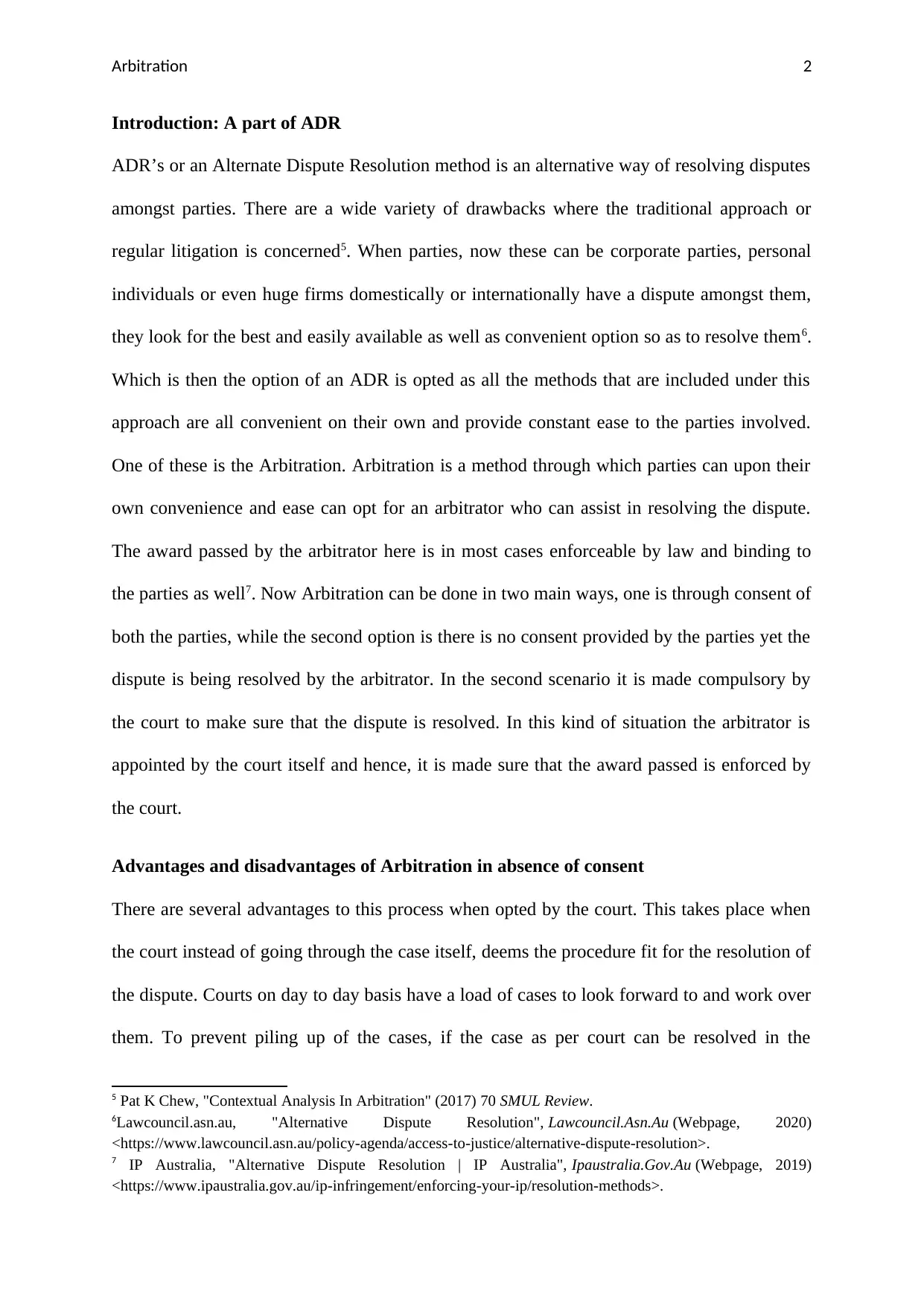
Arbitration 2
Introduction: A part of ADR
ADR’s or an Alternate Dispute Resolution method is an alternative way of resolving disputes
amongst parties. There are a wide variety of drawbacks where the traditional approach or
regular litigation is concerned5. When parties, now these can be corporate parties, personal
individuals or even huge firms domestically or internationally have a dispute amongst them,
they look for the best and easily available as well as convenient option so as to resolve them6.
Which is then the option of an ADR is opted as all the methods that are included under this
approach are all convenient on their own and provide constant ease to the parties involved.
One of these is the Arbitration. Arbitration is a method through which parties can upon their
own convenience and ease can opt for an arbitrator who can assist in resolving the dispute.
The award passed by the arbitrator here is in most cases enforceable by law and binding to
the parties as well7. Now Arbitration can be done in two main ways, one is through consent of
both the parties, while the second option is there is no consent provided by the parties yet the
dispute is being resolved by the arbitrator. In the second scenario it is made compulsory by
the court to make sure that the dispute is resolved. In this kind of situation the arbitrator is
appointed by the court itself and hence, it is made sure that the award passed is enforced by
the court.
Advantages and disadvantages of Arbitration in absence of consent
There are several advantages to this process when opted by the court. This takes place when
the court instead of going through the case itself, deems the procedure fit for the resolution of
the dispute. Courts on day to day basis have a load of cases to look forward to and work over
them. To prevent piling up of the cases, if the case as per court can be resolved in the
5 Pat K Chew, "Contextual Analysis In Arbitration" (2017) 70 SMUL Review.
6Lawcouncil.asn.au, "Alternative Dispute Resolution", Lawcouncil.Asn.Au (Webpage, 2020)
<https://www.lawcouncil.asn.au/policy-agenda/access-to-justice/alternative-dispute-resolution>.
7 IP Australia, "Alternative Dispute Resolution | IP Australia", Ipaustralia.Gov.Au (Webpage, 2019)
<https://www.ipaustralia.gov.au/ip-infringement/enforcing-your-ip/resolution-methods>.
Introduction: A part of ADR
ADR’s or an Alternate Dispute Resolution method is an alternative way of resolving disputes
amongst parties. There are a wide variety of drawbacks where the traditional approach or
regular litigation is concerned5. When parties, now these can be corporate parties, personal
individuals or even huge firms domestically or internationally have a dispute amongst them,
they look for the best and easily available as well as convenient option so as to resolve them6.
Which is then the option of an ADR is opted as all the methods that are included under this
approach are all convenient on their own and provide constant ease to the parties involved.
One of these is the Arbitration. Arbitration is a method through which parties can upon their
own convenience and ease can opt for an arbitrator who can assist in resolving the dispute.
The award passed by the arbitrator here is in most cases enforceable by law and binding to
the parties as well7. Now Arbitration can be done in two main ways, one is through consent of
both the parties, while the second option is there is no consent provided by the parties yet the
dispute is being resolved by the arbitrator. In the second scenario it is made compulsory by
the court to make sure that the dispute is resolved. In this kind of situation the arbitrator is
appointed by the court itself and hence, it is made sure that the award passed is enforced by
the court.
Advantages and disadvantages of Arbitration in absence of consent
There are several advantages to this process when opted by the court. This takes place when
the court instead of going through the case itself, deems the procedure fit for the resolution of
the dispute. Courts on day to day basis have a load of cases to look forward to and work over
them. To prevent piling up of the cases, if the case as per court can be resolved in the
5 Pat K Chew, "Contextual Analysis In Arbitration" (2017) 70 SMUL Review.
6Lawcouncil.asn.au, "Alternative Dispute Resolution", Lawcouncil.Asn.Au (Webpage, 2020)
<https://www.lawcouncil.asn.au/policy-agenda/access-to-justice/alternative-dispute-resolution>.
7 IP Australia, "Alternative Dispute Resolution | IP Australia", Ipaustralia.Gov.Au (Webpage, 2019)
<https://www.ipaustralia.gov.au/ip-infringement/enforcing-your-ip/resolution-methods>.
⊘ This is a preview!⊘
Do you want full access?
Subscribe today to unlock all pages.

Trusted by 1+ million students worldwide
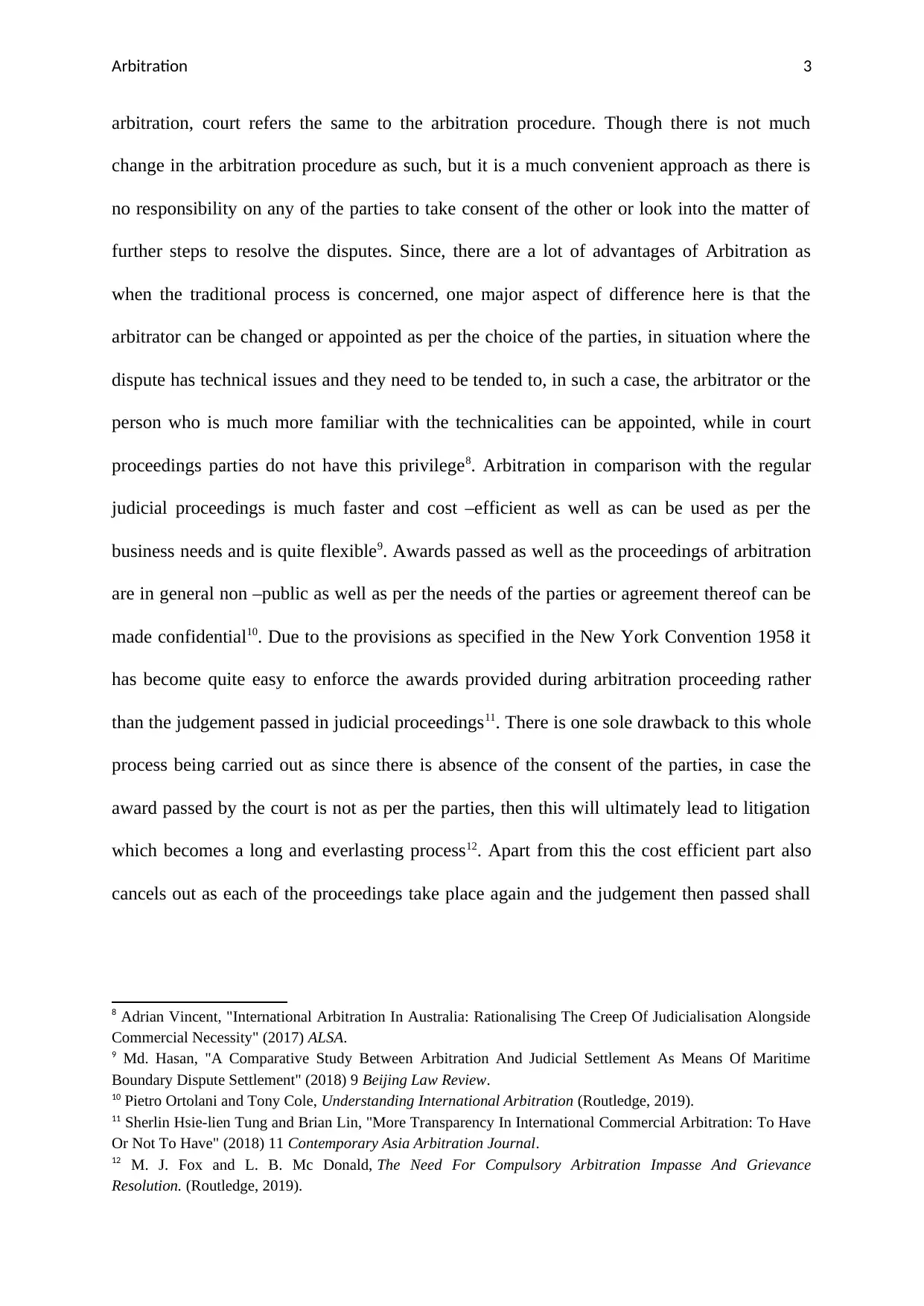
Arbitration 3
arbitration, court refers the same to the arbitration procedure. Though there is not much
change in the arbitration procedure as such, but it is a much convenient approach as there is
no responsibility on any of the parties to take consent of the other or look into the matter of
further steps to resolve the disputes. Since, there are a lot of advantages of Arbitration as
when the traditional process is concerned, one major aspect of difference here is that the
arbitrator can be changed or appointed as per the choice of the parties, in situation where the
dispute has technical issues and they need to be tended to, in such a case, the arbitrator or the
person who is much more familiar with the technicalities can be appointed, while in court
proceedings parties do not have this privilege8. Arbitration in comparison with the regular
judicial proceedings is much faster and cost –efficient as well as can be used as per the
business needs and is quite flexible9. Awards passed as well as the proceedings of arbitration
are in general non –public as well as per the needs of the parties or agreement thereof can be
made confidential10. Due to the provisions as specified in the New York Convention 1958 it
has become quite easy to enforce the awards provided during arbitration proceeding rather
than the judgement passed in judicial proceedings11. There is one sole drawback to this whole
process being carried out as since there is absence of the consent of the parties, in case the
award passed by the court is not as per the parties, then this will ultimately lead to litigation
which becomes a long and everlasting process12. Apart from this the cost efficient part also
cancels out as each of the proceedings take place again and the judgement then passed shall
8 Adrian Vincent, "International Arbitration In Australia: Rationalising The Creep Of Judicialisation Alongside
Commercial Necessity" (2017) ALSA.
9 Md. Hasan, "A Comparative Study Between Arbitration And Judicial Settlement As Means Of Maritime
Boundary Dispute Settlement" (2018) 9 Beijing Law Review.
10 Pietro Ortolani and Tony Cole, Understanding International Arbitration (Routledge, 2019).
11 Sherlin Hsie-lien Tung and Brian Lin, "More Transparency In International Commercial Arbitration: To Have
Or Not To Have" (2018) 11 Contemporary Asia Arbitration Journal.
12 M. J. Fox and L. B. Mc Donald, The Need For Compulsory Arbitration Impasse And Grievance
Resolution. (Routledge, 2019).
arbitration, court refers the same to the arbitration procedure. Though there is not much
change in the arbitration procedure as such, but it is a much convenient approach as there is
no responsibility on any of the parties to take consent of the other or look into the matter of
further steps to resolve the disputes. Since, there are a lot of advantages of Arbitration as
when the traditional process is concerned, one major aspect of difference here is that the
arbitrator can be changed or appointed as per the choice of the parties, in situation where the
dispute has technical issues and they need to be tended to, in such a case, the arbitrator or the
person who is much more familiar with the technicalities can be appointed, while in court
proceedings parties do not have this privilege8. Arbitration in comparison with the regular
judicial proceedings is much faster and cost –efficient as well as can be used as per the
business needs and is quite flexible9. Awards passed as well as the proceedings of arbitration
are in general non –public as well as per the needs of the parties or agreement thereof can be
made confidential10. Due to the provisions as specified in the New York Convention 1958 it
has become quite easy to enforce the awards provided during arbitration proceeding rather
than the judgement passed in judicial proceedings11. There is one sole drawback to this whole
process being carried out as since there is absence of the consent of the parties, in case the
award passed by the court is not as per the parties, then this will ultimately lead to litigation
which becomes a long and everlasting process12. Apart from this the cost efficient part also
cancels out as each of the proceedings take place again and the judgement then passed shall
8 Adrian Vincent, "International Arbitration In Australia: Rationalising The Creep Of Judicialisation Alongside
Commercial Necessity" (2017) ALSA.
9 Md. Hasan, "A Comparative Study Between Arbitration And Judicial Settlement As Means Of Maritime
Boundary Dispute Settlement" (2018) 9 Beijing Law Review.
10 Pietro Ortolani and Tony Cole, Understanding International Arbitration (Routledge, 2019).
11 Sherlin Hsie-lien Tung and Brian Lin, "More Transparency In International Commercial Arbitration: To Have
Or Not To Have" (2018) 11 Contemporary Asia Arbitration Journal.
12 M. J. Fox and L. B. Mc Donald, The Need For Compulsory Arbitration Impasse And Grievance
Resolution. (Routledge, 2019).
Paraphrase This Document
Need a fresh take? Get an instant paraphrase of this document with our AI Paraphraser
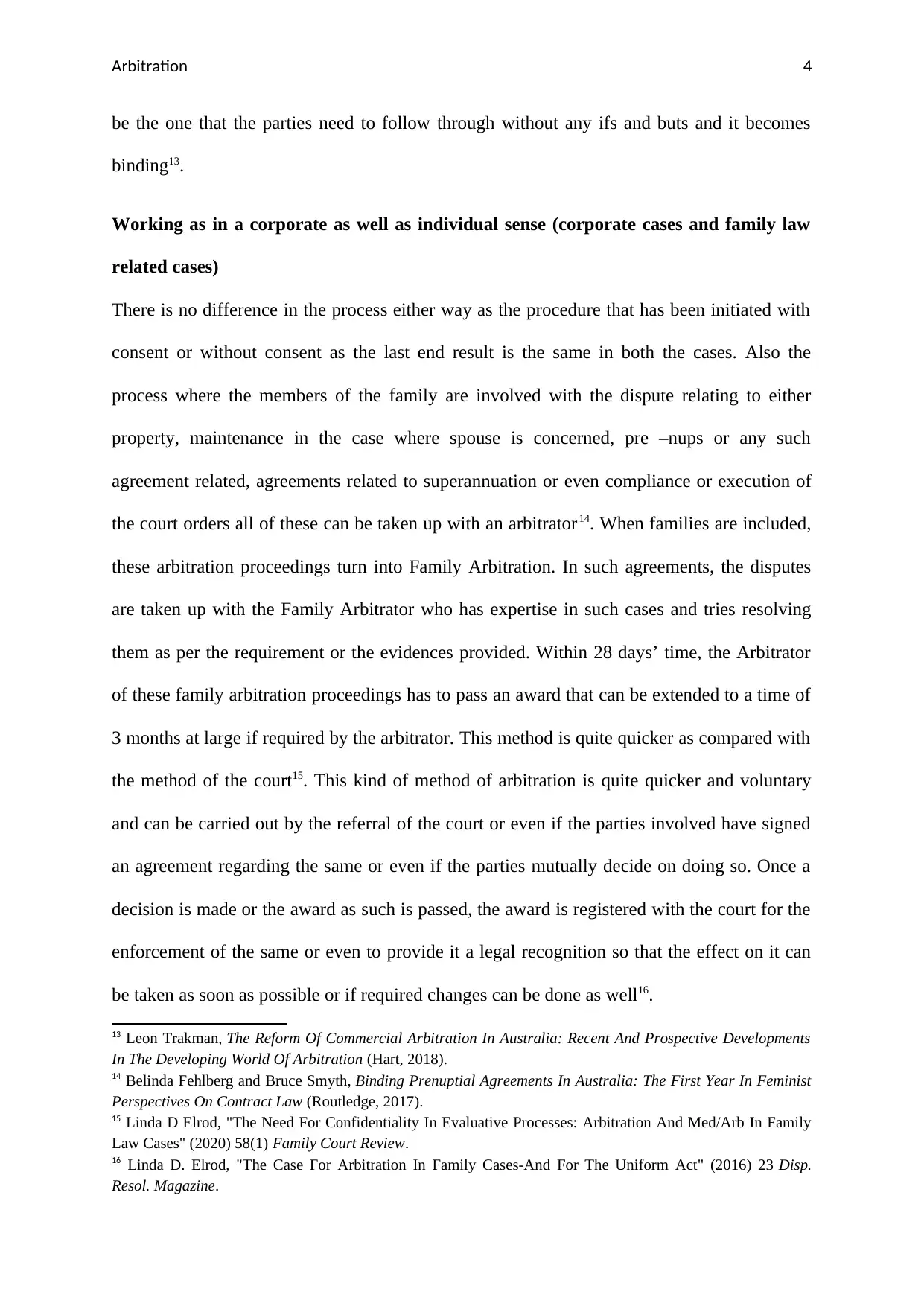
Arbitration 4
be the one that the parties need to follow through without any ifs and buts and it becomes
binding13.
Working as in a corporate as well as individual sense (corporate cases and family law
related cases)
There is no difference in the process either way as the procedure that has been initiated with
consent or without consent as the last end result is the same in both the cases. Also the
process where the members of the family are involved with the dispute relating to either
property, maintenance in the case where spouse is concerned, pre –nups or any such
agreement related, agreements related to superannuation or even compliance or execution of
the court orders all of these can be taken up with an arbitrator14. When families are included,
these arbitration proceedings turn into Family Arbitration. In such agreements, the disputes
are taken up with the Family Arbitrator who has expertise in such cases and tries resolving
them as per the requirement or the evidences provided. Within 28 days’ time, the Arbitrator
of these family arbitration proceedings has to pass an award that can be extended to a time of
3 months at large if required by the arbitrator. This method is quite quicker as compared with
the method of the court15. This kind of method of arbitration is quite quicker and voluntary
and can be carried out by the referral of the court or even if the parties involved have signed
an agreement regarding the same or even if the parties mutually decide on doing so. Once a
decision is made or the award as such is passed, the award is registered with the court for the
enforcement of the same or even to provide it a legal recognition so that the effect on it can
be taken as soon as possible or if required changes can be done as well16.
13 Leon Trakman, The Reform Of Commercial Arbitration In Australia: Recent And Prospective Developments
In The Developing World Of Arbitration (Hart, 2018).
14 Belinda Fehlberg and Bruce Smyth, Binding Prenuptial Agreements In Australia: The First Year In Feminist
Perspectives On Contract Law (Routledge, 2017).
15 Linda D Elrod, "The Need For Confidentiality In Evaluative Processes: Arbitration And Med/Arb In Family
Law Cases" (2020) 58(1) Family Court Review.
16 Linda D. Elrod, "The Case For Arbitration In Family Cases-And For The Uniform Act" (2016) 23 Disp.
Resol. Magazine.
be the one that the parties need to follow through without any ifs and buts and it becomes
binding13.
Working as in a corporate as well as individual sense (corporate cases and family law
related cases)
There is no difference in the process either way as the procedure that has been initiated with
consent or without consent as the last end result is the same in both the cases. Also the
process where the members of the family are involved with the dispute relating to either
property, maintenance in the case where spouse is concerned, pre –nups or any such
agreement related, agreements related to superannuation or even compliance or execution of
the court orders all of these can be taken up with an arbitrator14. When families are included,
these arbitration proceedings turn into Family Arbitration. In such agreements, the disputes
are taken up with the Family Arbitrator who has expertise in such cases and tries resolving
them as per the requirement or the evidences provided. Within 28 days’ time, the Arbitrator
of these family arbitration proceedings has to pass an award that can be extended to a time of
3 months at large if required by the arbitrator. This method is quite quicker as compared with
the method of the court15. This kind of method of arbitration is quite quicker and voluntary
and can be carried out by the referral of the court or even if the parties involved have signed
an agreement regarding the same or even if the parties mutually decide on doing so. Once a
decision is made or the award as such is passed, the award is registered with the court for the
enforcement of the same or even to provide it a legal recognition so that the effect on it can
be taken as soon as possible or if required changes can be done as well16.
13 Leon Trakman, The Reform Of Commercial Arbitration In Australia: Recent And Prospective Developments
In The Developing World Of Arbitration (Hart, 2018).
14 Belinda Fehlberg and Bruce Smyth, Binding Prenuptial Agreements In Australia: The First Year In Feminist
Perspectives On Contract Law (Routledge, 2017).
15 Linda D Elrod, "The Need For Confidentiality In Evaluative Processes: Arbitration And Med/Arb In Family
Law Cases" (2020) 58(1) Family Court Review.
16 Linda D. Elrod, "The Case For Arbitration In Family Cases-And For The Uniform Act" (2016) 23 Disp.
Resol. Magazine.
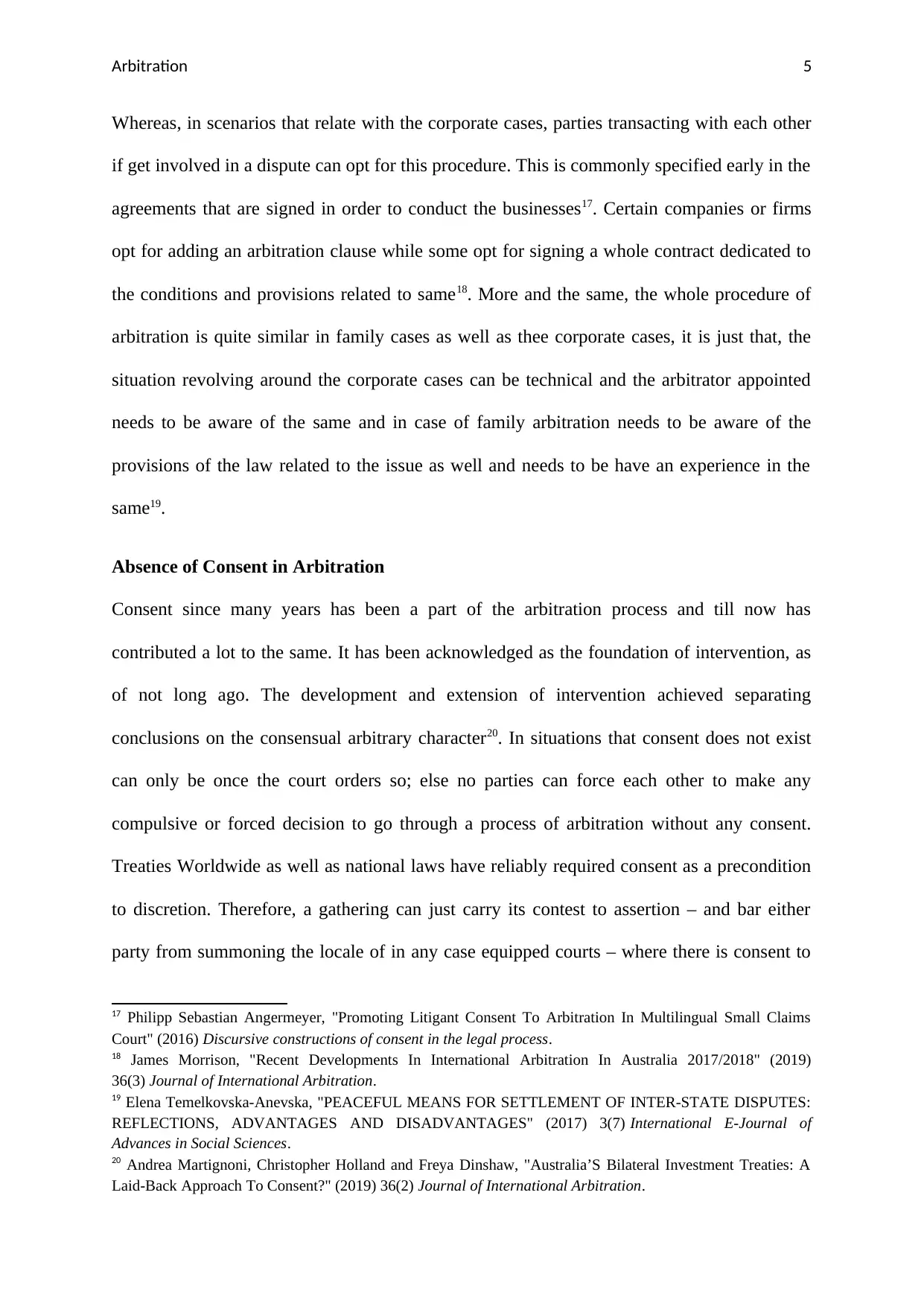
Arbitration 5
Whereas, in scenarios that relate with the corporate cases, parties transacting with each other
if get involved in a dispute can opt for this procedure. This is commonly specified early in the
agreements that are signed in order to conduct the businesses17. Certain companies or firms
opt for adding an arbitration clause while some opt for signing a whole contract dedicated to
the conditions and provisions related to same18. More and the same, the whole procedure of
arbitration is quite similar in family cases as well as thee corporate cases, it is just that, the
situation revolving around the corporate cases can be technical and the arbitrator appointed
needs to be aware of the same and in case of family arbitration needs to be aware of the
provisions of the law related to the issue as well and needs to be have an experience in the
same19.
Absence of Consent in Arbitration
Consent since many years has been a part of the arbitration process and till now has
contributed a lot to the same. It has been acknowledged as the foundation of intervention, as
of not long ago. The development and extension of intervention achieved separating
conclusions on the consensual arbitrary character20. In situations that consent does not exist
can only be once the court orders so; else no parties can force each other to make any
compulsive or forced decision to go through a process of arbitration without any consent.
Treaties Worldwide as well as national laws have reliably required consent as a precondition
to discretion. Therefore, a gathering can just carry its contest to assertion – and bar either
party from summoning the locale of in any case equipped courts – where there is consent to
17 Philipp Sebastian Angermeyer, "Promoting Litigant Consent To Arbitration In Multilingual Small Claims
Court" (2016) Discursive constructions of consent in the legal process.
18 James Morrison, "Recent Developments In International Arbitration In Australia 2017/2018" (2019)
36(3) Journal of International Arbitration.
19 Elena Temelkovska-Anevska, "PEACEFUL MEANS FOR SETTLEMENT OF INTER-STATE DISPUTES:
REFLECTIONS, ADVANTAGES AND DISADVANTAGES" (2017) 3(7) International E-Journal of
Advances in Social Sciences.
20 Andrea Martignoni, Christopher Holland and Freya Dinshaw, "Australia’S Bilateral Investment Treaties: A
Laid-Back Approach To Consent?" (2019) 36(2) Journal of International Arbitration.
Whereas, in scenarios that relate with the corporate cases, parties transacting with each other
if get involved in a dispute can opt for this procedure. This is commonly specified early in the
agreements that are signed in order to conduct the businesses17. Certain companies or firms
opt for adding an arbitration clause while some opt for signing a whole contract dedicated to
the conditions and provisions related to same18. More and the same, the whole procedure of
arbitration is quite similar in family cases as well as thee corporate cases, it is just that, the
situation revolving around the corporate cases can be technical and the arbitrator appointed
needs to be aware of the same and in case of family arbitration needs to be aware of the
provisions of the law related to the issue as well and needs to be have an experience in the
same19.
Absence of Consent in Arbitration
Consent since many years has been a part of the arbitration process and till now has
contributed a lot to the same. It has been acknowledged as the foundation of intervention, as
of not long ago. The development and extension of intervention achieved separating
conclusions on the consensual arbitrary character20. In situations that consent does not exist
can only be once the court orders so; else no parties can force each other to make any
compulsive or forced decision to go through a process of arbitration without any consent.
Treaties Worldwide as well as national laws have reliably required consent as a precondition
to discretion. Therefore, a gathering can just carry its contest to assertion – and bar either
party from summoning the locale of in any case equipped courts – where there is consent to
17 Philipp Sebastian Angermeyer, "Promoting Litigant Consent To Arbitration In Multilingual Small Claims
Court" (2016) Discursive constructions of consent in the legal process.
18 James Morrison, "Recent Developments In International Arbitration In Australia 2017/2018" (2019)
36(3) Journal of International Arbitration.
19 Elena Temelkovska-Anevska, "PEACEFUL MEANS FOR SETTLEMENT OF INTER-STATE DISPUTES:
REFLECTIONS, ADVANTAGES AND DISADVANTAGES" (2017) 3(7) International E-Journal of
Advances in Social Sciences.
20 Andrea Martignoni, Christopher Holland and Freya Dinshaw, "Australia’S Bilateral Investment Treaties: A
Laid-Back Approach To Consent?" (2019) 36(2) Journal of International Arbitration.
⊘ This is a preview!⊘
Do you want full access?
Subscribe today to unlock all pages.

Trusted by 1+ million students worldwide
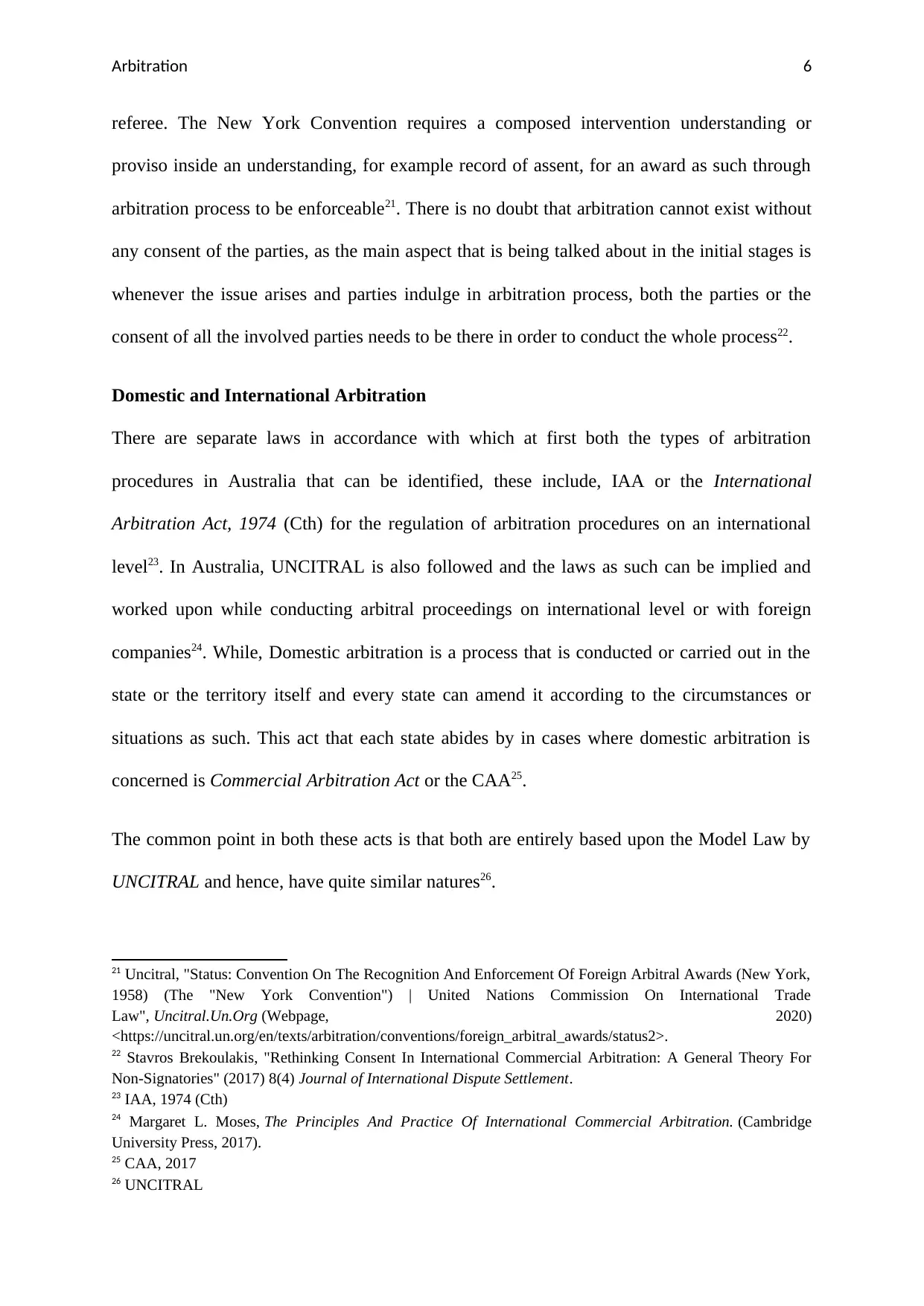
Arbitration 6
referee. The New York Convention requires a composed intervention understanding or
proviso inside an understanding, for example record of assent, for an award as such through
arbitration process to be enforceable21. There is no doubt that arbitration cannot exist without
any consent of the parties, as the main aspect that is being talked about in the initial stages is
whenever the issue arises and parties indulge in arbitration process, both the parties or the
consent of all the involved parties needs to be there in order to conduct the whole process22.
Domestic and International Arbitration
There are separate laws in accordance with which at first both the types of arbitration
procedures in Australia that can be identified, these include, IAA or the International
Arbitration Act, 1974 (Cth) for the regulation of arbitration procedures on an international
level23. In Australia, UNCITRAL is also followed and the laws as such can be implied and
worked upon while conducting arbitral proceedings on international level or with foreign
companies24. While, Domestic arbitration is a process that is conducted or carried out in the
state or the territory itself and every state can amend it according to the circumstances or
situations as such. This act that each state abides by in cases where domestic arbitration is
concerned is Commercial Arbitration Act or the CAA25.
The common point in both these acts is that both are entirely based upon the Model Law by
UNCITRAL and hence, have quite similar natures26.
21 Uncitral, "Status: Convention On The Recognition And Enforcement Of Foreign Arbitral Awards (New York,
1958) (The "New York Convention") | United Nations Commission On International Trade
Law", Uncitral.Un.Org (Webpage, 2020)
<https://uncitral.un.org/en/texts/arbitration/conventions/foreign_arbitral_awards/status2>.
22 Stavros Brekoulakis, "Rethinking Consent In International Commercial Arbitration: A General Theory For
Non-Signatories" (2017) 8(4) Journal of International Dispute Settlement.
23 IAA, 1974 (Cth)
24 Margaret L. Moses, The Principles And Practice Of International Commercial Arbitration. (Cambridge
University Press, 2017).
25 CAA, 2017
26 UNCITRAL
referee. The New York Convention requires a composed intervention understanding or
proviso inside an understanding, for example record of assent, for an award as such through
arbitration process to be enforceable21. There is no doubt that arbitration cannot exist without
any consent of the parties, as the main aspect that is being talked about in the initial stages is
whenever the issue arises and parties indulge in arbitration process, both the parties or the
consent of all the involved parties needs to be there in order to conduct the whole process22.
Domestic and International Arbitration
There are separate laws in accordance with which at first both the types of arbitration
procedures in Australia that can be identified, these include, IAA or the International
Arbitration Act, 1974 (Cth) for the regulation of arbitration procedures on an international
level23. In Australia, UNCITRAL is also followed and the laws as such can be implied and
worked upon while conducting arbitral proceedings on international level or with foreign
companies24. While, Domestic arbitration is a process that is conducted or carried out in the
state or the territory itself and every state can amend it according to the circumstances or
situations as such. This act that each state abides by in cases where domestic arbitration is
concerned is Commercial Arbitration Act or the CAA25.
The common point in both these acts is that both are entirely based upon the Model Law by
UNCITRAL and hence, have quite similar natures26.
21 Uncitral, "Status: Convention On The Recognition And Enforcement Of Foreign Arbitral Awards (New York,
1958) (The "New York Convention") | United Nations Commission On International Trade
Law", Uncitral.Un.Org (Webpage, 2020)
<https://uncitral.un.org/en/texts/arbitration/conventions/foreign_arbitral_awards/status2>.
22 Stavros Brekoulakis, "Rethinking Consent In International Commercial Arbitration: A General Theory For
Non-Signatories" (2017) 8(4) Journal of International Dispute Settlement.
23 IAA, 1974 (Cth)
24 Margaret L. Moses, The Principles And Practice Of International Commercial Arbitration. (Cambridge
University Press, 2017).
25 CAA, 2017
26 UNCITRAL
Paraphrase This Document
Need a fresh take? Get an instant paraphrase of this document with our AI Paraphraser
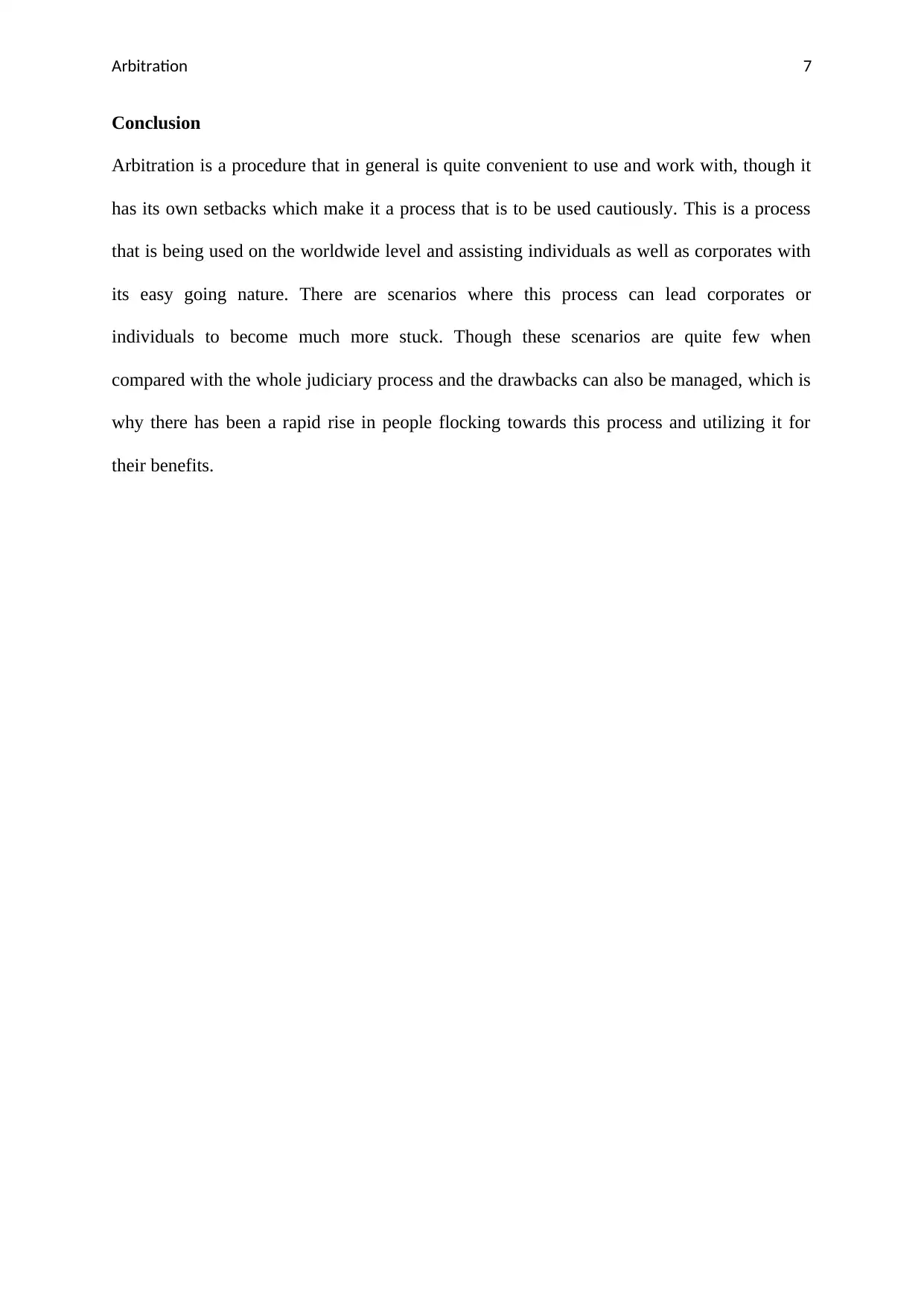
Arbitration 7
Conclusion
Arbitration is a procedure that in general is quite convenient to use and work with, though it
has its own setbacks which make it a process that is to be used cautiously. This is a process
that is being used on the worldwide level and assisting individuals as well as corporates with
its easy going nature. There are scenarios where this process can lead corporates or
individuals to become much more stuck. Though these scenarios are quite few when
compared with the whole judiciary process and the drawbacks can also be managed, which is
why there has been a rapid rise in people flocking towards this process and utilizing it for
their benefits.
Conclusion
Arbitration is a procedure that in general is quite convenient to use and work with, though it
has its own setbacks which make it a process that is to be used cautiously. This is a process
that is being used on the worldwide level and assisting individuals as well as corporates with
its easy going nature. There are scenarios where this process can lead corporates or
individuals to become much more stuck. Though these scenarios are quite few when
compared with the whole judiciary process and the drawbacks can also be managed, which is
why there has been a rapid rise in people flocking towards this process and utilizing it for
their benefits.
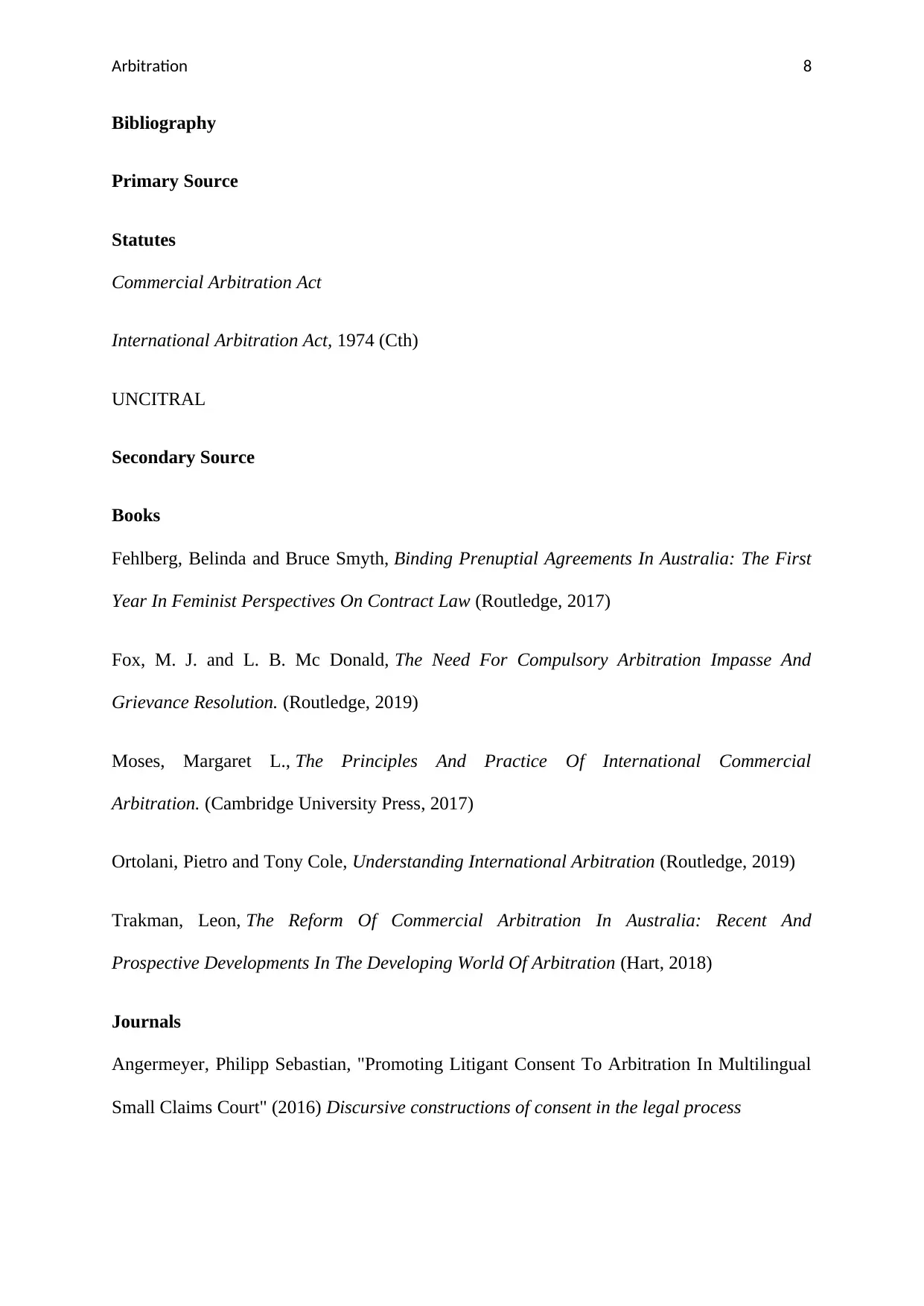
Arbitration 8
Bibliography
Primary Source
Statutes
Commercial Arbitration Act
International Arbitration Act, 1974 (Cth)
UNCITRAL
Secondary Source
Books
Fehlberg, Belinda and Bruce Smyth, Binding Prenuptial Agreements In Australia: The First
Year In Feminist Perspectives On Contract Law (Routledge, 2017)
Fox, M. J. and L. B. Mc Donald, The Need For Compulsory Arbitration Impasse And
Grievance Resolution. (Routledge, 2019)
Moses, Margaret L., The Principles And Practice Of International Commercial
Arbitration. (Cambridge University Press, 2017)
Ortolani, Pietro and Tony Cole, Understanding International Arbitration (Routledge, 2019)
Trakman, Leon, The Reform Of Commercial Arbitration In Australia: Recent And
Prospective Developments In The Developing World Of Arbitration (Hart, 2018)
Journals
Angermeyer, Philipp Sebastian, "Promoting Litigant Consent To Arbitration In Multilingual
Small Claims Court" (2016) Discursive constructions of consent in the legal process
Bibliography
Primary Source
Statutes
Commercial Arbitration Act
International Arbitration Act, 1974 (Cth)
UNCITRAL
Secondary Source
Books
Fehlberg, Belinda and Bruce Smyth, Binding Prenuptial Agreements In Australia: The First
Year In Feminist Perspectives On Contract Law (Routledge, 2017)
Fox, M. J. and L. B. Mc Donald, The Need For Compulsory Arbitration Impasse And
Grievance Resolution. (Routledge, 2019)
Moses, Margaret L., The Principles And Practice Of International Commercial
Arbitration. (Cambridge University Press, 2017)
Ortolani, Pietro and Tony Cole, Understanding International Arbitration (Routledge, 2019)
Trakman, Leon, The Reform Of Commercial Arbitration In Australia: Recent And
Prospective Developments In The Developing World Of Arbitration (Hart, 2018)
Journals
Angermeyer, Philipp Sebastian, "Promoting Litigant Consent To Arbitration In Multilingual
Small Claims Court" (2016) Discursive constructions of consent in the legal process
⊘ This is a preview!⊘
Do you want full access?
Subscribe today to unlock all pages.

Trusted by 1+ million students worldwide
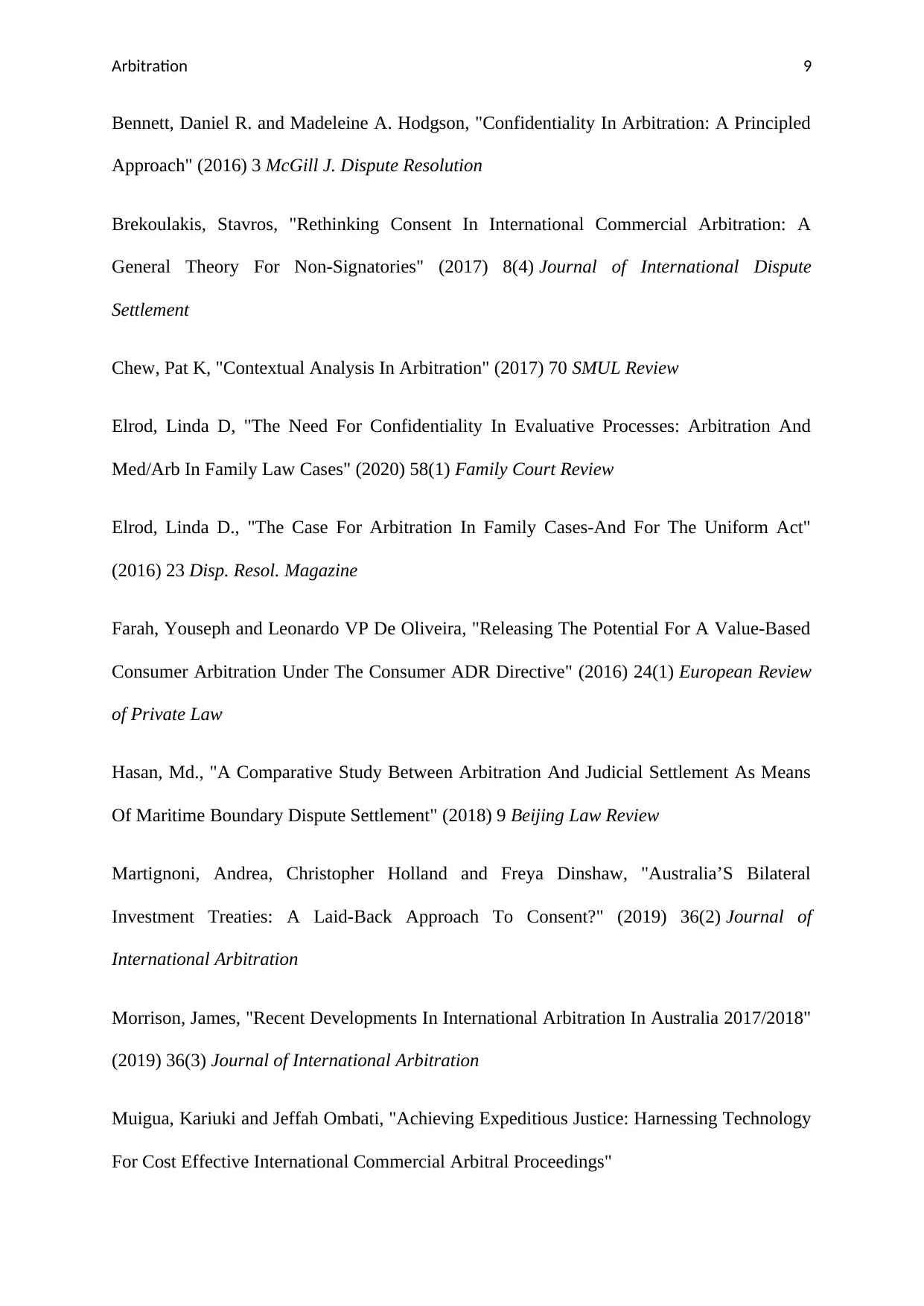
Arbitration 9
Bennett, Daniel R. and Madeleine A. Hodgson, "Confidentiality In Arbitration: A Principled
Approach" (2016) 3 McGill J. Dispute Resolution
Brekoulakis, Stavros, "Rethinking Consent In International Commercial Arbitration: A
General Theory For Non-Signatories" (2017) 8(4) Journal of International Dispute
Settlement
Chew, Pat K, "Contextual Analysis In Arbitration" (2017) 70 SMUL Review
Elrod, Linda D, "The Need For Confidentiality In Evaluative Processes: Arbitration And
Med/Arb In Family Law Cases" (2020) 58(1) Family Court Review
Elrod, Linda D., "The Case For Arbitration In Family Cases-And For The Uniform Act"
(2016) 23 Disp. Resol. Magazine
Farah, Youseph and Leonardo VP De Oliveira, "Releasing The Potential For A Value-Based
Consumer Arbitration Under The Consumer ADR Directive" (2016) 24(1) European Review
of Private Law
Hasan, Md., "A Comparative Study Between Arbitration And Judicial Settlement As Means
Of Maritime Boundary Dispute Settlement" (2018) 9 Beijing Law Review
Martignoni, Andrea, Christopher Holland and Freya Dinshaw, "Australia’S Bilateral
Investment Treaties: A Laid-Back Approach To Consent?" (2019) 36(2) Journal of
International Arbitration
Morrison, James, "Recent Developments In International Arbitration In Australia 2017/2018"
(2019) 36(3) Journal of International Arbitration
Muigua, Kariuki and Jeffah Ombati, "Achieving Expeditious Justice: Harnessing Technology
For Cost Effective International Commercial Arbitral Proceedings"
Bennett, Daniel R. and Madeleine A. Hodgson, "Confidentiality In Arbitration: A Principled
Approach" (2016) 3 McGill J. Dispute Resolution
Brekoulakis, Stavros, "Rethinking Consent In International Commercial Arbitration: A
General Theory For Non-Signatories" (2017) 8(4) Journal of International Dispute
Settlement
Chew, Pat K, "Contextual Analysis In Arbitration" (2017) 70 SMUL Review
Elrod, Linda D, "The Need For Confidentiality In Evaluative Processes: Arbitration And
Med/Arb In Family Law Cases" (2020) 58(1) Family Court Review
Elrod, Linda D., "The Case For Arbitration In Family Cases-And For The Uniform Act"
(2016) 23 Disp. Resol. Magazine
Farah, Youseph and Leonardo VP De Oliveira, "Releasing The Potential For A Value-Based
Consumer Arbitration Under The Consumer ADR Directive" (2016) 24(1) European Review
of Private Law
Hasan, Md., "A Comparative Study Between Arbitration And Judicial Settlement As Means
Of Maritime Boundary Dispute Settlement" (2018) 9 Beijing Law Review
Martignoni, Andrea, Christopher Holland and Freya Dinshaw, "Australia’S Bilateral
Investment Treaties: A Laid-Back Approach To Consent?" (2019) 36(2) Journal of
International Arbitration
Morrison, James, "Recent Developments In International Arbitration In Australia 2017/2018"
(2019) 36(3) Journal of International Arbitration
Muigua, Kariuki and Jeffah Ombati, "Achieving Expeditious Justice: Harnessing Technology
For Cost Effective International Commercial Arbitral Proceedings"
Paraphrase This Document
Need a fresh take? Get an instant paraphrase of this document with our AI Paraphraser
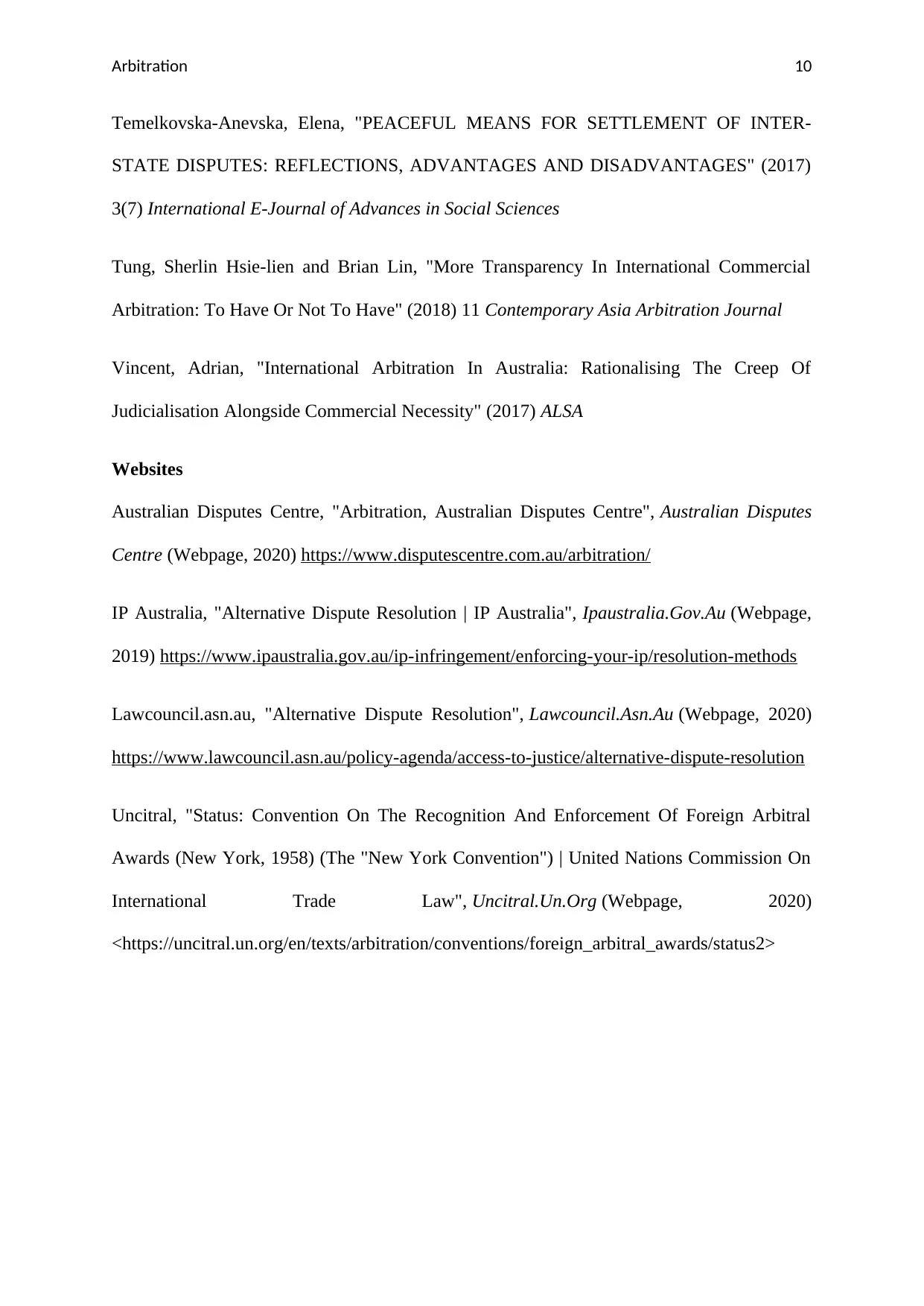
Arbitration 10
Temelkovska-Anevska, Elena, "PEACEFUL MEANS FOR SETTLEMENT OF INTER-
STATE DISPUTES: REFLECTIONS, ADVANTAGES AND DISADVANTAGES" (2017)
3(7) International E-Journal of Advances in Social Sciences
Tung, Sherlin Hsie-lien and Brian Lin, "More Transparency In International Commercial
Arbitration: To Have Or Not To Have" (2018) 11 Contemporary Asia Arbitration Journal
Vincent, Adrian, "International Arbitration In Australia: Rationalising The Creep Of
Judicialisation Alongside Commercial Necessity" (2017) ALSA
Websites
Australian Disputes Centre, "Arbitration, Australian Disputes Centre", Australian Disputes
Centre (Webpage, 2020) https://www.disputescentre.com.au/arbitration/
IP Australia, "Alternative Dispute Resolution | IP Australia", Ipaustralia.Gov.Au (Webpage,
2019) https://www.ipaustralia.gov.au/ip-infringement/enforcing-your-ip/resolution-methods
Lawcouncil.asn.au, "Alternative Dispute Resolution", Lawcouncil.Asn.Au (Webpage, 2020)
https://www.lawcouncil.asn.au/policy-agenda/access-to-justice/alternative-dispute-resolution
Uncitral, "Status: Convention On The Recognition And Enforcement Of Foreign Arbitral
Awards (New York, 1958) (The "New York Convention") | United Nations Commission On
International Trade Law", Uncitral.Un.Org (Webpage, 2020)
<https://uncitral.un.org/en/texts/arbitration/conventions/foreign_arbitral_awards/status2>
Temelkovska-Anevska, Elena, "PEACEFUL MEANS FOR SETTLEMENT OF INTER-
STATE DISPUTES: REFLECTIONS, ADVANTAGES AND DISADVANTAGES" (2017)
3(7) International E-Journal of Advances in Social Sciences
Tung, Sherlin Hsie-lien and Brian Lin, "More Transparency In International Commercial
Arbitration: To Have Or Not To Have" (2018) 11 Contemporary Asia Arbitration Journal
Vincent, Adrian, "International Arbitration In Australia: Rationalising The Creep Of
Judicialisation Alongside Commercial Necessity" (2017) ALSA
Websites
Australian Disputes Centre, "Arbitration, Australian Disputes Centre", Australian Disputes
Centre (Webpage, 2020) https://www.disputescentre.com.au/arbitration/
IP Australia, "Alternative Dispute Resolution | IP Australia", Ipaustralia.Gov.Au (Webpage,
2019) https://www.ipaustralia.gov.au/ip-infringement/enforcing-your-ip/resolution-methods
Lawcouncil.asn.au, "Alternative Dispute Resolution", Lawcouncil.Asn.Au (Webpage, 2020)
https://www.lawcouncil.asn.au/policy-agenda/access-to-justice/alternative-dispute-resolution
Uncitral, "Status: Convention On The Recognition And Enforcement Of Foreign Arbitral
Awards (New York, 1958) (The "New York Convention") | United Nations Commission On
International Trade Law", Uncitral.Un.Org (Webpage, 2020)
<https://uncitral.un.org/en/texts/arbitration/conventions/foreign_arbitral_awards/status2>
1 out of 11
Related Documents
Your All-in-One AI-Powered Toolkit for Academic Success.
+13062052269
info@desklib.com
Available 24*7 on WhatsApp / Email
![[object Object]](/_next/static/media/star-bottom.7253800d.svg)
Unlock your academic potential
Copyright © 2020–2026 A2Z Services. All Rights Reserved. Developed and managed by ZUCOL.




